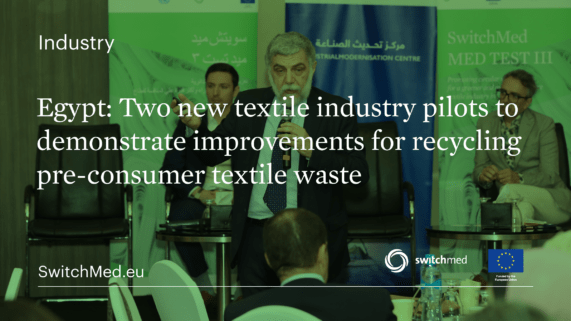
On 26 May, the United Nations Industrial Development Organization (UNIDO) presented, during a launching event in Cairo, two pilot projects that under the EU-funded SwitchMed/MED TEST III project will demonstrate processes until 2023, technologies and management standards that can improve the handling and recycling of pre-consumer textile waste in Egypt.
What used to be considered a cost for businesses, textile waste today plays an increasingly important role as a resource for international brands in their global supply chain.
Early 2022, a SwitchMed waste-mapping study, undertaken by Blumine & Reverse Resources, revealed that Egypt’s textile and clothing industry generates approximately 212,000 tons of pre-consumer post-industrial textile waste per year. This waste is generated from the production of textiles and garments and consist of cutting scraps, second quality products, spillage, and other textile wastes.
“At the moment the market for recycled fibres is a niche, but it is a market with a huge potential. A report states that in 2027 the amount of recycled fibres used in the production will almost double compared to 2020,” says Marco Ricchetti, CEO of Blumine. “What is interesting is that this growth is not limited by demand, it is limited by the availability as there are not enough recycling capacities around the world.”
Textile-to textile recycling facilities are already under operation in Egypt, but they often rely on imported textile waste as an input, primarily due to quality issues of the local feedstock. Valorizing some of Egypt’s ‘valuable’ pre-consumer textile waste could help reduce Egypt’s dependency on imported short-fibre cotton as this type of textile waste has a very high recycling potential and is estimated to make up 50% of the annual pre-consumer textile waste generated in Egypt’s industry.
Based on the waste mapping study findings, two industrial pilots have been identified to demonstrate the different steps and business models for valorizing pre-consumer textile waste in Egypt.
In the first pilot, UNIDO together with international experts will evaluate the technological options for investing in best-available technologies, assessing both mechanical and chemical recycling technologies, to increase the recycling capacities of pre-consumer textile waste in the country. The aim is to develop a roadmap on investments and policy actions that can up-scale textile recycling in the country.
To address the insufficient availability and categorization of pre-consumer textile waste in Egypt, the second SwitchMed pilot will gather a ‘network’ of waste generators (industries) to establish a common waste collection that can improve the quality, value and traceability of pre-consumer textile waste in Egypt. The objective will also be to improve the feedstock of locally generate pre-consumer textile waste and to demonstrate business opportunities to actors along the textile waste value chain.
Outcomes from the two industry demonstration projects will be used in developing a roadmap for Egypt that can further the uptake of recycling standards for pre-consumer textile waste and develop the capacities in Egypt to provide recycled textile fibres for the domestic and global market.
The roadmap intends to support authorities, industry federations, and actors in Egypt’s textile and clothing value chain on how to remove obstacles that impede a practical, feasible and profitable valorization of pre-consumer textile waste in Egypt.
More information on the SwitchMed/MED TEST III demonstration pilots in Egypt is available in English and Arabic.
18/05/2024 · INDUSTRY AND SERVICE PROVIDERS
Closing event of the SwitchMed MED TEST III project in Egypt presented a roadmap for developing recycling initiatives and removing barriers that could increase the valorization of post-industrial textile waste in Egypt. See more
30/04/2024 · INDUSTRY AND SERVICE PROVIDERS
Industry pilot projects demonstrate circular economy principles, converting 68,000 tons of cutting waste into 224,000 pairs of jeans with 20% recycled content. See more
19/03/2024 · INDUSTRY AND SERVICE PROVIDERS
Technical assistance from UNIDO demonstrates innovative business models that promote resource efficiency and valorization potential in critical Lebanese sectors See more
29/02/2024 · INDUSTRY AND SERVICE PROVIDERS
An exhibition featuring a capsule collection of garments designed using circular design techniques by students at the CasaModa Academy in Casablanca, Morocco, presented in an exhibition during the Milan Fashion Week. See more